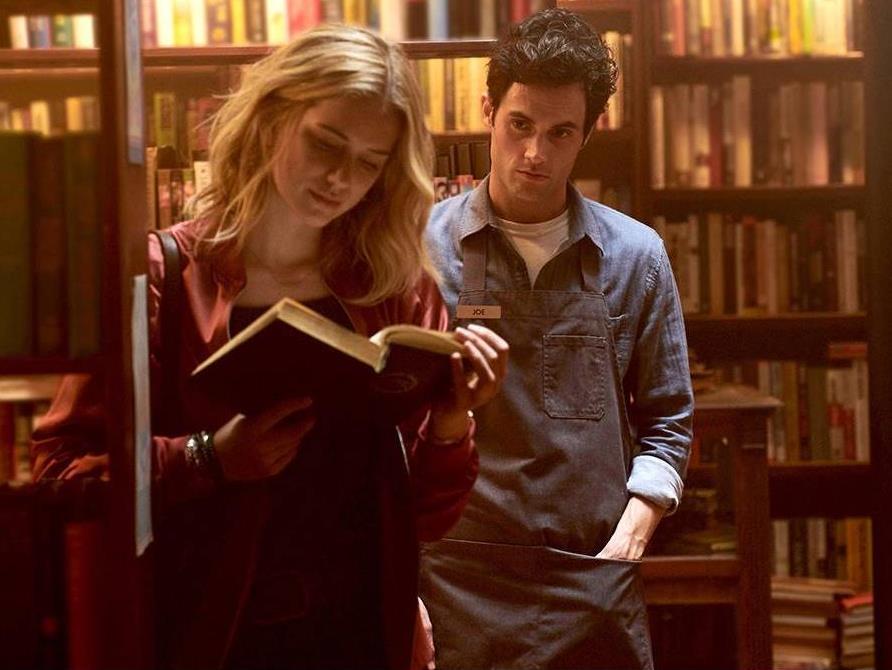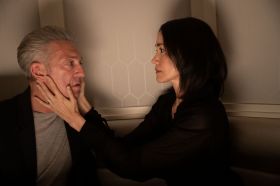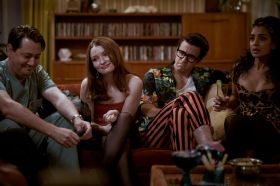Image: You. Source: Netflix.
A little over twenty years ago, an independent American movie about the rock music scene popped up at a small-scale screening event in Melbourne: the now forgotten Slaves to the Underground (1996), directed by Kristine Peterson. A minor film, but containing one remarkable scene in which a character’s raging monologue expressed a new, politicised awareness about the supposedly “innocent” genre of romantic comedy:
‘The Graduate is my mother’s favourite movie. And the other night it occurred to me that it’s actually a movie about a stalker. I mean, here’s this guy; he’s obsessed with this girl, and even though she tells him to go away and her parents tell him to go away, he keeps after her, follows her around, and then trashes her wedding. The Dustin Hoffman character is actually a selfish, irresponsible proto-slacker, who at the end of the film takes this poor girl hostage. It’s your basic romantic slacker/stalker film. And this was the movie that defined a generation – my parents’ generation.’
The charmingly nutty, fixated guy who loves the woman of his dreams so much that he takes apart her ordinary, routine life: that’s been, more or less, a standard plot in many a romantic comedy, ranging from the 1930s to John Cassavetes’ Minnie and Moskowitz in the ‘70s and Garry Marshall’s Frankie and Johnny in the ‘90s. But it only takes a small shove, as the heroine of Slaves to the Underground suggested, for this persistent suitor to morph into a stalker – or far worse. That’s the premise of the Lifetime/Netflix series You, which began airing in September 2018 and already has its second season in the pipeline.
Both seasons, developed by Greg Berlanti and Sera Gamble, take off from material in novels by Caroline Kepnes, You and Hidden Bodies. For Joe (Penn Badgley), working at the counter of his quaint New York bookstore, it’s love at first sight when he spots Beck (Elizabeth Lail). A master of every form of personal surveillance bequeathed to us by social media, Joe not only worms his way into each corner of Beck’s life, but also endeavours to “manage” all other influences and contacts in her daily rounds. And then there’s the looming enigma of whatever happened to Joe’s previous flame, Candace (Ambyr Childers), not to mention the malign influence, in his youth, of father-figure Mr Mooney (Mark Blum) …
At least since the first season of Dexter in 2006, serial television has been in love with these ambiguous heroes who commit atrocious, heinous acts, while seducing us (and everybody around them) with their charisma, wit and flair. As in the low-budget 1960s indie classic David Holzman’s Diary by Jim McBride – a very prescient dramatisation of the intimate connection between romantic fantasy and outright stalking – Joe’s obsessive tendency gradually turns from adoration to suspicion: what is Beck hiding, what’s her “secret self”?
You takes not only its script cues from the romantic comedy genre, but also a certain “screwball” rhythm and style – updated for the age of text messaging (superimposed on whatever scene is playing through) and related Internet distractions. This ultra-fast pace gives a hallucinatory edge to almost everything going on – and the general air of unrealism helps us skip over the many improbabilities of the script (such as how Joe can stare at – as well as perfectly hear – virtually anybody anywhere in public, without ever being caught). It also puts us in the head of Joe, even in the middle of normal conversational scenes – his voice-over musings provide, hands down, the best and wickedest bon mots of the series (such as “Beck and a bottle of booze. What could go wrong?”).
Above all, the slick patter and jazzy montage of You manage to frequently lull us into a state of temporary amnesia as viewers, until we are forcibly brought up short: in-between all these cute scenes of love-matching and making-up, some nasty, violent things are actually going on. (No plot spoilers here for the uninitiated.) A sub-plot involving Joe’s apartment-block neighbours adds further complications and possibilities.
You puts its central premise through a few different gear-shifts – and usually just at the point when you feel it is about to become stale and repetitive. A key moment in Joe’s romantic conquest of Beck reveals him to be not exactly at peak performance in the bedroom. In the fourth episode, the narrating voice-over suddenly switches over to Beck for twenty minutes – giving us an entirely different perspective on her propensity for keeping secrets. And Beck’s various friends and associates keep constellating into different patterns of response in relation to Joe, variously admiring and jealous. In the second season, the action will shift to Los Angeles – no doubt giving Joe a new set of colourful passers-by to insult in his nimble mind.
Another nimble mind, the French philosopher Gilles Deleuze, once chummily confided to the students in a film-school seminar: “If you get trapped in the dream of the Other” – i.e., caught inside somebody’s fantasy-projection – “then you’re screwed”. It’s just a pity for Beck that she takes so long to start wondering, in a similar vein, whether Prince Charming and Bluebeard may not be exactly the same guy.
|
4 stars
|
★★★★
|
© Adrian Martin, February 2019
Actors:
Director:
Format:
Country:
Release:





